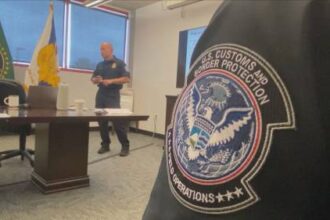In a concerning development for British Columbia’s public health system, health authorities have confirmed multiple new cases of measles in both Kamloops and Chilliwack, signaling what experts fear could become a more widespread outbreak if containment measures aren’t rapidly implemented.
The Interior Health Authority and Fraser Health officials announced yesterday that five individuals have tested positive for the highly contagious virus, with three cases in Kamloops and two in Chilliwack. This marks the largest cluster of related measles cases in the province since 2019, raising alarms among public health officials.
“What makes measles particularly dangerous is that an infected person can transmit the virus to up to 18 others who aren’t immune,” explained Dr. Catherine Miller, Provincial Health Officer. “The virus can remain suspended in the air for up to two hours after an infected person has left the area, making public spaces significant transmission vectors.”
Health authorities have initiated contact tracing efforts to identify anyone who may have been exposed to the infected individuals. Officials have confirmed that one of the Kamloops cases involved an individual who had recently visited a shopping mall, potentially exposing hundreds of others.
Vaccination records indicate all five infected individuals were unvaccinated, reinforcing the critical importance of maintaining high MMR vaccination rates across communities. Provincial data shows immunization rates have dropped below the 95% threshold needed for effective herd immunity in several regions, creating vulnerable pockets where the virus can spread rapidly.
“This outbreak serves as a stark reminder that vaccine-preventable diseases haven’t disappeared,” said Dr. James Thornton, infectious disease specialist at Royal Inland Hospital. “They’re simply waiting for opportunities when our collective immunity wanes.”
The initial case appears to have been imported from international travel, with genetic sequencing linking it to a strain currently circulating in Eastern Europe. Health officials are particularly concerned about the timing, as spring break travel could potentially accelerate transmission across provincial boundaries.
Symptoms typically appear 7-14 days after exposure and include high fever, cough, runny nose, red and watery eyes, followed by the characteristic rash that spreads from the face downward. While most recover, measles can lead to serious complications including pneumonia, encephalitis, and even death, particularly in young children and those with compromised immune systems.
Fraser Health has established temporary vaccination clinics in both affected communities, offering free MMR vaccines to anyone who hasn’t received their recommended doses. Officials are urging parents to check their children’s immunization records and ensure they’re up to date.
“We’re at a critical juncture where a swift response can prevent this outbreak from becoming a major public health emergency,” emphasized Dr. Miller. “Vaccination remains our most effective tool against measles.”
As health authorities race to contain the spread, this outbreak raises important questions about the fragility of public health achievements in the face of vaccine hesitancy. Have we become complacent about diseases that previous generations feared, and what will it take to restore the community protection that once kept these preventable illnesses at bay?










